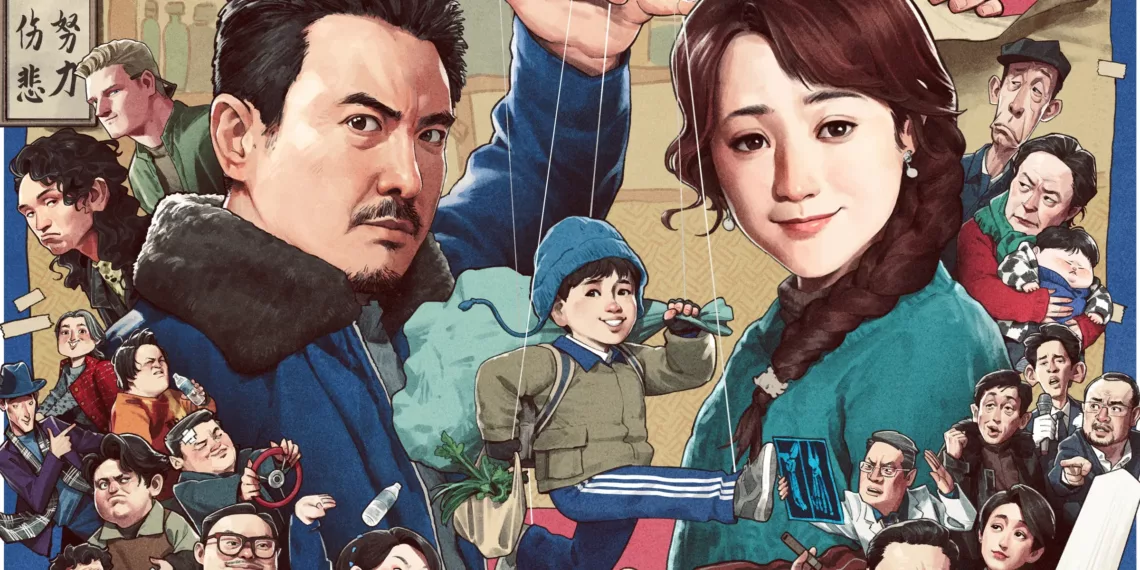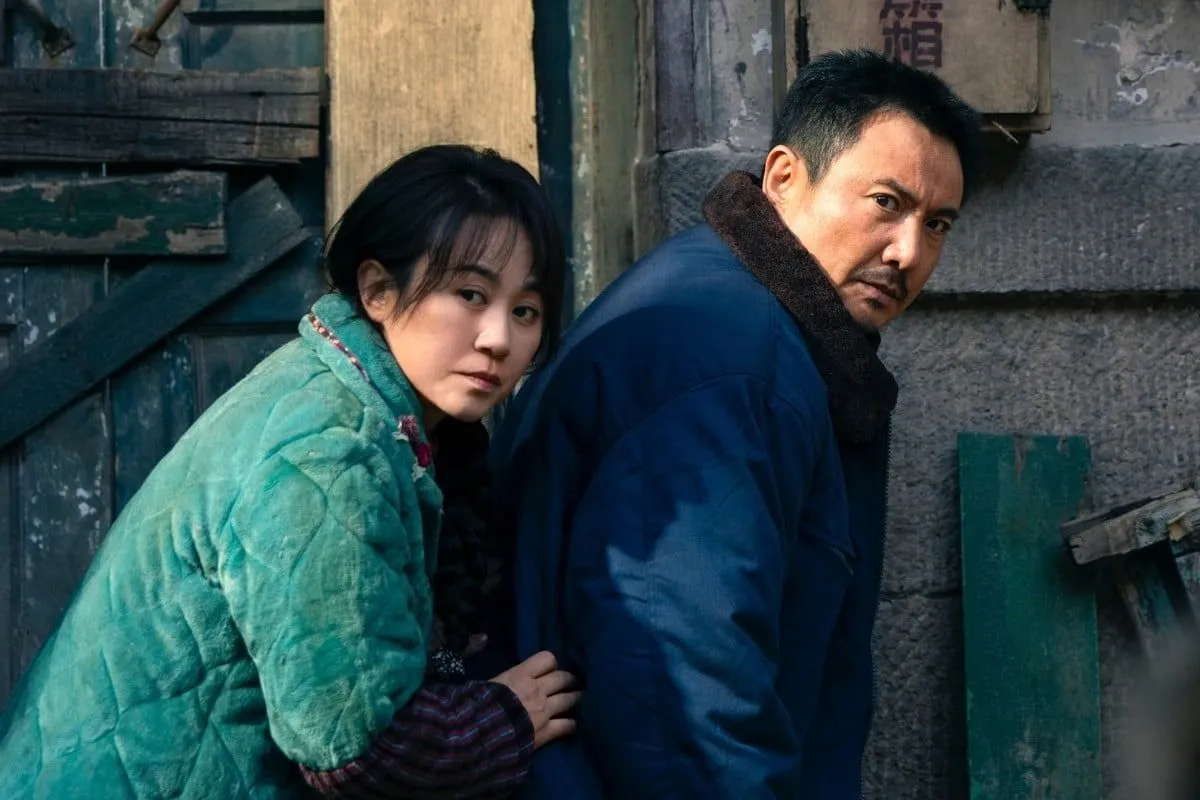Set in the fictional Chinese city of Slinkytown, Successor brings us the story of Ma Chenggang, played by veteran actor Shen Teng. Directed by Yan Fei and Peng Damo, this 2024 comedy follows Chenggang and his attempts to raise his son Jiye with strong character.
Though Chenggang comes from great wealth as a businessman, he stages an elaborate ruse to make Jiye believe his family lives in poverty. Young Jiye is played by Xiao Bochen, while Shi Pengyuan takes on the role as he becomes a teenager.
We learn Chenggang hopes that facing life’s struggles will shape Jiye into an honorable man ready to inherit his vast commercial empire one day. However, Chenggang takes deception to an extreme, creating the illusion of destitution while secretly monitoring Jiye’s every move through advanced technology.
As Jiye grows older, cracks begin to show in his father’s fabrication. Questions arise about whether Chenggang’s single-minded parenting style truly benefits the boy or merely serves the father’s own ambitions.
This review aims to take a comprehensive look at Successor. We’ll analyze its themes of parental control clashes against youth independence. Acting and comedic aspects will be addressed as well. Most of all, I seek to appreciate what Successor brings to the table while also critically examining how effectively it balances humor with serious explorations of family and society. With both laughter and insightful observations in store, let’s delve into the return of Successor.
Gaining Insight
Successor takes us on quite the journey. We’re introduced to wealthy businessman Ma Chenggang, who wants nothing more than to shape his son Jiye into an honorable man. However, Chenggang feels conventional methods aren’t enough.
In the fictional city of Slinkytown, Chenggang stages an elaborate ruse. He moves his family into dilapidated housing, pretending they live in poverty. Young Jiye is none the wiser as he attends school each day. But little does Jiye know—his father covertly oversees a high-tech system monitoring his every move.
While Jiye follows the routine of a working-class child, eventually he starts to suspect something isn’t right. Strange coincidences occur, and Jiye’s curiosity grows. In Chenggang’s mind, the hardships Jiye faces will teach valuable life lessons.
As the boy becomes a teenager, cracks begin emerging in the facade. Played ably by Xiao Bochen and Shi Pengyuan, Jiye pieces together that his world is not as it seems. A plot twist arrives when Jiye discovers his wealthy status, changing their relationship. Chenggang’s once noble goal sours into something more sinister and controlling.
The revelations throw Jiye, wondering what in his life has been real. He must determine his own path. Meanwhile, Chenggang’s mother and Jiye’s teacher play supporting roles, and Jiye connects with his long-lost half-brother. Through surprising events, Jiye gains insight into his unusual upbringing and stakes a claim on defining his future.
By the climactic end, Successor explores more complex themes of parental influence colliding with a child’s independence. Jiye’s journey is one of discovery as artificial realities fall away, leaving truth and choice in their wake.
Exploring Purpose and Parental Control
Successor takes on some weighty topics. At its core, the film examines suffocating parenting styles and how total control over a child’s life can be misguided or even harmful.
Ma Chenggang believes the path to virtue is hardship. By dictating Jiye’s every experience from the shadows, he hopes to shape his son into a moral leader. Yet the film implies guidance works best without deception or dominance. Jiye deserves freedom over his own choices and future.
Class difference also factors in. Chenggang wants Jiye to understand hardship, albeit artificially, so he respects wealth. But did fakery truly teach gratitude or breed resentment toward his father’s methods?
Through the lens of China’s rapid changes, it considers what “success” means to new generations. Jiye slowly realizes he can define himself rather than conform to his dad’s ambitions. The film empowers youth to decide their own path.
Some have seen societal commentary, from authoritarian parenting mirroring an oppressive state to capitalism’s prioritization over individualism. But interpretations vary—the film raises questions more than answers.
Overall, Successor delves into complex themes about individual agency, purposeful living, and what truly cultivates virtue. It challenges whether total control creates good people or just well-behaved ones. In the process, the film sparks insightful discussions around its layered meanings.
Capturing Craft and Character
Successor shows the skills that made directors Yan Fei and Peng Damo masters of their craft. They immerse us in Slinkytown through detailed production design, from run-down homes to bustling streets. Imagine this world feels seamless.
Cinematography by Zhang Yang also feels transportive. Her camera embraces both quaint neighborhoods and sprawling secret control rooms with equal flair. Clever shots help unfold the mystery.
But it’s the acting that truly anchors Successor. As Ma Chenggang, Shen Teng brings nuanced layers to a flawed yet complex paternal figure. He makes Chenggang’s good intentions feel genuine, yet leaves room to question his methods.
As young Jiye, Xiao Bochen excels at wide-eyed wonder, gradually mingling with wariness. Shi Pengyuan then seamlessly picks up this energy as an older Jiye awakening to deceptions. Their bond feels authentic.
Veteran actress Sa Rina breathes heart into her supporting role. And comedic veterans like her enhance Successor’s lighter moments.
Admittedly, elements like pacing and cohesion could feel sharper. But Yan and Peng’s finesse with their chosen crafts—from using tools like editing to maximize performances—makes for an engrossing watch overall. Their ensemble ensures Successor stays memorable long after the credits roll.
Questioning Perspectives
Successor tackles complex themes, but how fully does it flesh them out? The film raises insightful questions about parenting and individualism, but could its messages be more nuanced?
Comedy works well to introduce philosophy, yet gaslighting jokes feel overused. And while laughing, did audiences reflect on the social issues introduced? By not condemning Chenggang outright, Successor leaves perspective open to interpretation.
Culturally, it engagingly portrays family and society dynamics reshaping today’s China. But some topics feel restricted by a need to please mainstream viewers. Historical context informs without passing judgment too.
Creative choices like vivid production design transport us to Slinkytown. But repetitive structures weaken story cohesion. And aside from Jiye’s journey, did other characters develop fully?
When satirizing oppressive control, did Successor avoid exercising its own? By challenging viewers without an answer, it sparks discussion over flawed heroes and societal changes. But debates could analyze highlighted issues more deeply.
Overall, Successor raises thought-provoking uncertainties rather than solutions. It draws us into Jiye’s confronting discovery and fuels interpreting societal roles from new angles. While imperfect, the film gets us questioning established perspectives in a changing world.
Examining Influences
Successor takes inspiration from stories that came before. Its fundamental ruse undoubtedly hearkens back to classic social experiments portrayed on screen.
Truman Show comes to mind—another man oblivious as life spins around him, engineered by puppet masters. Yet Successor questions control in a distinctly Chinese context.
Where that film skewered Western superficiality, here societal expectations face scrutiny. Jiye also progresses differently to Truman; learning freedom means self-definition above obedience.
One More Chance showed similar paternal ambitions, but Successor subverts expectations. Rather than condemn, it provokes thought on parenting, individualism, and changing ideals.
Through humor and philosophical optimism, Yan Fei and Peng Damo craft valued commentary. Like predecessors, their craftsmanship engages and entertains and leaves interpretive space.
Successor diverges too, avoiding didacticism. It challenges without absolutes, as complex issues rarely have simple answers. Jiye’s journey resonates broadly without losing cultural specificity.
By drawing on influential works, Successor cultivates insightful perspectives. It stands out through ambitious storytelling that sparks fruitful discussion on societal transformations. Ultimately, the film enriches its genre through thoughtful innovations and ambiguities.
Contemplating Legacy
Successors undoubtedly stir conversations on parenting, individuality, and China’s changing social landscape. Director Yan Fei and Peng Damo show a deft comic touch and passionate storytelling ability.
While repetitiveness and an imbalance between humor and substance hold it back, the heartfelt performances from Shen Teng and the two Jiyes anchor an impactful exploration of family and self-discovery.
There is power in its refusal to condemn without nuance. Instead, Successor sparks reflection on controlling one’s destiny versus sacrificing autonomy. Its ambiguity leaves interpretations open—an achievement in its own right.
Ultimately, the film lives on not through absolute answers but meaningful discussions. It stays with us not just due to laughs but questions raised about society’s expectations. Like Jiye emerging from his father’s illusion, Successor sees beyond one singular viewpoint.
In cultivating thought on transitioning social roles, this unlikely box office juggernaut may prove one of cinema’s most influential Chinese works. Its legacy will be continuing the conversations it began—on fathers and sons, freedom, and responsibility in a changing world.
The Review
Successor
Successor proves a very good film that falls just shy of excellent due to intermittent storytelling snags. However, its cultural impact is likely to exceed its flaws due to the questions it raises and perspectives it provides.
PROS
- Thought-provoking exploration of parental influence, identity, and societal expectations
- A nuanced lead performance by Shen Teng anchors the personal journey of his character.
- Sparks insightful discussions on family relationships and China's shifting social roles
- Ambiguous storytelling encourages analytical interpretations over simplistic judgments.
- Powerful without pandering by prioritizing complexity over didacticism
CONS
- Narrative cohesion is slightly diminished by some repetitive plot elements.
- Balance tilts more toward sober themes than fulfilling comedic potential at times.
- Storytelling polish could be sharper to match thematic ambitions.
- Pacing slows in places from weighting themes over propelling the plot.


















































